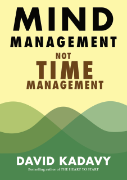Subscribe to blog updates via email »
Finish What Matters (Forget the Rest) – Love Your Work, Episode 275
 One thing I hear from a lot from readers of The Heart to Start, is that many people have no problem starting new projects. They instead struggle with finishing them. I can relate.
One thing I hear from a lot from readers of The Heart to Start, is that many people have no problem starting new projects. They instead struggle with finishing them. I can relate.
Listen to the Podcast

WANT TO WRITE A BOOK?
Download your FREE copy of How to Write a Book »
(for a limited time)
- Listen in iTunes >>
- Download as an MP3 by right-clicking here and choosing “save as.”
- RSS feed for Love Your Work
Like many creative people, I once struggled to finish projects. I always had new ideas, I left books half-read, projects half-finished. I had done lots of creative work, and had little to show for it.
Now I still always have new ideas, and I still leave books half-read and projects half-finished. But now, I have lots of finished projects to show for all the work I’ve done.
What’s changed? I’ve learned to finish what matters, and forget the rest.
Embrace your inner Perceiver
A turning point in my own creative journey came when I learned to embrace my inner Perceiver. As much flak as the Myers-Briggs Personality Type Indicator gets for being pseudoscience, it’s still a useful lens for understanding your own tendencies. The concepts of Introversion and Extroversion have wide scientific support, but also useful I think are the concepts of “Perceiving” and “Judging.”
If you watch in awe as one friend after another executes on ideas and achieves success, while you flounder, working on one idea after another, but never truly following through, your friends are probably “Js”, and you might be a “P.”
This is the position I was in, until a friend at a party explained this dichotomy to me. Why was this other friend of ours so great at follow-through, while we both struggled to find our paths? This friend was a J. We were Ps.
Another way of thinking about being a Perceiver is you’re someone who sees Possibilities. You can’t move forward with one idea, because you keep having other, better ideas. Meanwhile, your “Judging” friends find an idea, make the judgement to stick with it, and see it through.
Shiny objects aren’t shameful
Perceiving Possibilities is a necessary part of being creative. For DNA to be discovered, the researchers had to entertain the Possibility that they should pursue something other than the original intent of their grant application – which was to study cancer treatments. For Alexander Fleming to discover antibiotics, he had to see Possibilities in experimental petri dishes that were contaminated.
If you want a treasure trove of Perceivers, look no further than nearly every person Walter Isaacson has written a biography on.
For Leonardo Da Vinci to paint the Mona Lisa, he applied his knowledge of optics to his sfumato technique, which allowed him to model the painting with no hard lines. He applied his knowledge of anatomy to crafting the Mona Lisa’s mysterious smirk. He had dissected humans and animals, studying exactly which muscles were recruited to express various emotions.
In episode 272, I talked about how Steve Jobs and the engineers and executives at Apple had to consider the Possibility that while a trackwheel served as a useful interface for an iPod, it might not be such for the iPhone.
Isaacson himself has said, “People who love all fields of knowledge are the ones who can best spot the patterns across nature.”
So if you’re someone who beats themself up over Shiny Object Syndrome, consider the Possibility that it’s a necessary component of creative thinking.
Creative success happens in Extremistan
On the rare occasion that someone with shiny object syndrome does finish a project, it might not be successful, and that can make matters worse. Why bother following through with anything, you might think, when you aren’t assured of success?
But, creative work calls for a different approach to success. As I talked about in episode 253, creative work happens in Extremistan.
Nobody knows anything
It’s impossible to predict which creative projects will be successful. If record companies knew hits, that’s all they’d release. If movie studios knew blockbusters, that’s all they’d produce. If publishers knew bestsellers, that’s all they’d launch. If Venture Capitalists knew unicorns, that’s all they’d fund. And they wouldn’t be called “Venture” Capitalists – they’d just be Capitalists.
As two-time Academy-Award-winning screenwriter William Goldman said, “Nobody knows anything.”
The sky is the limit
Even when a creative project is released into Extremistan, there is a huge range of potential outcomes. When Art De Vany analyzed the box-office proceeds of various movies, he found that the top 1% of movies accounted for 20% of sales.
My latest book, Mind Management, Not Time Management is a success. Book-marketing expert Tucker Max calls a self-published book that sells 2,500 copies in its first year a “home run”. Mind Management, Not Time Management sold 10,000. But, Mark Manson’s Subtle Art has sold more than ten million.
This podcast episode will get more downloads than about 97% of other podcasts, but it’s not unusual for an episode of Joe Rogan’s podcast to get 1,000 times the downloads of this one.
It’s a long night to overnight success
When you follow through and put a creative project into the world, you may have mild success, or you may have wild success. But there’s no telling how long wild success can take.
The Queen’s Gambit took thirty-seven years to become a New York Times bestseller. Jane Austen’s books went out of print after her death. There’s no telling when a box-office bust will become a cult classic, or just a straight-up classic. People forget that The Shawshank Redemption was a box-office bomb, now considered by many to be the best movie of all time.
Like I talked about on episode 251, you can’t call out Suvivorship Bias so easily in creative work, because you often don’t know if a project is truly dead.
We’re raised in Mediocristan
Creative success happens in Extremistan, not Mediocristan, and this is at the heart of why many people feel ashamed of their shiny object syndrome. We’re raised in Mediocristan, so we evaluate success and our ability to follow through based upon how things get done in Mediocristan.
The whole point of civilization – with its steady paychecks, fixed-rate mortgages, and insurance policies – is to smooth out the shocks of the natural world. Mediocristan is built upon predictability, and to succeed by Mediocristan’s standards, you need to yourself be predictable. If you can follow the curriculum, do the reading, and fill out the bubbles on a standardized test with your standardized #2 pencil, you can get a good grade, that adds up to a good GPA, which lets you graduate and get your degree to put the right keywords in your resume so a computer can read it and find you. You can get a job, a steady paycheck, a fixed-rate mortgage, and an insurance policy.
But for any of these niceties of Mediocristan to exist, someone has to invent something. Before Henry Ford could double the going rate for a factory worker, introduce the five-dollar day, and have 10,000 people banging on his gates, he had to create those jobs.
You are a Maker/Capitalist
Even if you wanted to work in a factory in Mediocristan – besides the fact that few humans could handle the monotony of working on Ford’s assembly-line – these kinds of jobs are becoming more scarce. More of our drudgery is being handled by automation.
This is reducing the barriers to entry for putting ideas into the world. You can build a no-code app with Adalo or Webflow, you can print and ship artwork and memorabilia with Printful, you can – like me – sell thousands of print-on-demand books in dozens of countries around the world, and not touch a single one.
It used to require capital and labor to produce a good or service. Now, less labor is needed, and almost no capital. It used to require management to organize all that labor. Now management is the arrangement of automation – but “management” isn’t the right word for it, and neither is labor. The word “creator” embodies the trifecta of coming up with ideas, doing the work, and distributing the goods.
More and more of us can be creator/capitalists. We require little capital to fund our making, but we have to be adept at using what little capital we have wisely. Balaji Srinivasan would call us “capital allocators.”
Finish what matters, and forget the rest
If creative success is random, and happens upon a long timeline, how do you stay the course to embrace your shiny object syndrome and still ship projects?
Start by building your shipping skills, like I talked about on episode 265. Treat even the smallest projects in your life as opportunities to have a vision, form a plan, and carry out that plan. You can do this by cooking a recipe, planning a party or trip, and build into shipping small creative projects.
Learn to navigate uncertainty. Get used to making percentage-confidence predictions about the future, then evaluating those predictions down the road. You can learn with the Avocado Challenge I talked about on episode 245.
Remember that for Henry Ford to build the Model T, he had to iterate on Models A through S. Like a construction project that seems to make no progress, until suddenly a twenty-story building appears, you need to let the Foundation Effect happen, like I talked about on episode 266.
Remember the Iceberg Principle, like I talked about on episode 263. The same way ninety-percent of an iceberg is underwater, what you present to the world in your masterpiece will be just a small fraction of the knowledge and experimentation you put in. You have to embrace creative waste, like I talked about on episode 264.
As a creator/capitalist, you need to use your resources wisely. Use the Barbell Strategy that I talked about on episode 244. Put most of your resources toward “sure bets” that keep you in the game. But set aside time and energy to play wildcards – crazy ideas with little downside, but unlimited potential upside. Creative work is the business of breeding Black Swans.
Through this process, you won’t finish every project, and you won’t always be able to tell which projects matter. But with enough practice, over enough time, you’ll become adept at finishing what matters, and forgetting the rest.
Image: Characters In Yellow, Paul Klee
Mind Management is a Kindle Deal!
Amazon has hand-selected Mind Management, Not Time Management for a promotional discount. It’s only $2.49 on Amazon.com and Amazon.ca. Offer ends March 31st, so grab it now!
Join the Patreon for (new) bonus content!
I've been adding lots of new content to Patreon. Join the Patreon »
Subscribe to Love Your Work
Listen to the Podcast
- Listen in iTunes >>
- Download as an MP3 by right-clicking here and choosing “save as.”
- RSS feed for Love Your Work
Theme music: Dorena “At Sea”, from the album About Everything And More. By Arrangement with Deep Elm Records. Listen on Spotify »


